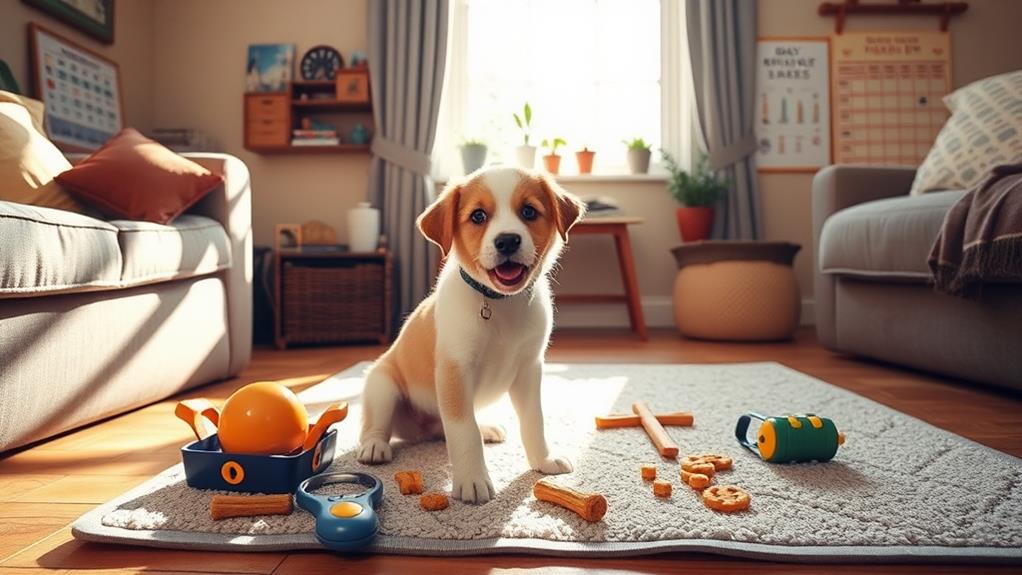Building a consistent daily routine for your puppy is essential for effective training. It provides security and helps establish good habits, like house training. Start each day with a morning potty break, followed by short training sessions that focus on commands and skills. Incorporate playtime and socialization to keep your puppy engaged. Consistency in commands, positive reinforcement, and patience are key to success. As your puppy grows, adapt the routine by introducing new tricks and adjusting session lengths. With a solid routine in place, you'll nurture both training and your bond, and there's much more to explore on this journey!
Importance of a Daily Routine
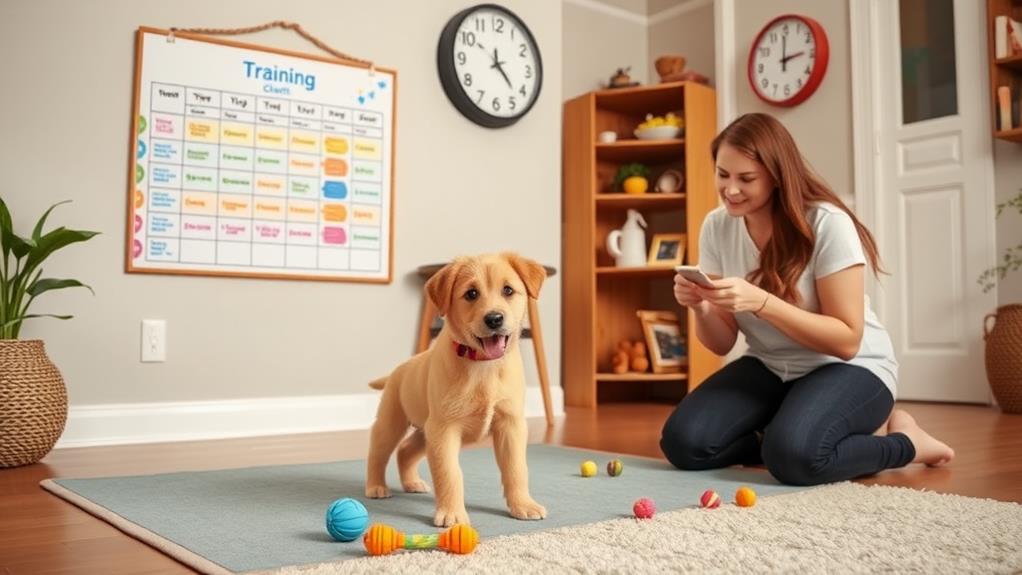
Why is establishing a daily routine so critical for your puppy? A consistent routine helps your puppy feel secure and understand what to expect throughout the day. When you create a schedule for feeding, potty breaks, and playtime, your puppy learns to anticipate these activities, reducing anxiety and confusion.
Routines also aid in developing good habits. By sticking to a regular schedule, your puppy will quickly learn when it's time to eat, sleep, and go outside, making house training much easier. This structure reinforces positive behavior and helps prevent accidents inside the house.
Moreover, a daily routine fosters a strong bond between you and your puppy. Through consistent interactions, your puppy learns to trust you and see you as a reliable source of care and guidance.
In addition, routines can help you manage your time more effectively. By setting aside specific times for training and socialization, you guarantee your puppy gets the attention they need while balancing your responsibilities.
Ultimately, a daily routine isn't just about structure; it's about nurturing your puppy's development and well-being. So, start building that routine today!
Key Components of Puppy Training
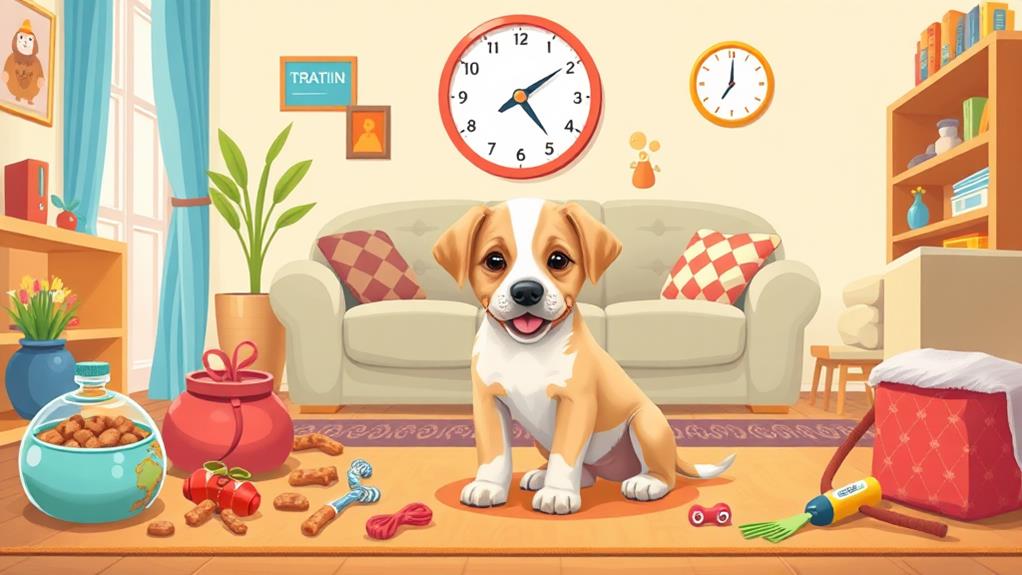
Establishing key components of puppy training guarantees your furry friend develops into a well-behaved companion. First, consistency is indispensable. You need to use the same commands and cues every time. This helps your puppy understand what you expect from them.
Next, positive reinforcement should be at the heart of your training. Reward your puppy with treats, praise, or playtime when they successfully follow your command. This encourages them to repeat the desired behavior.
Socialization is another essential component. Expose your puppy to different people, pets, and environments to help them become well-adjusted and confident. Early socialization can prevent behavioral issues down the line.
Additionally, patience plays a pivotal role in effective training. Every puppy learns at their own pace, so you must remain calm and understanding during the process.
Lastly, short and engaging training sessions work best. Puppies have short attention spans, so aim for 5 to 10 minutes per session. Keeping it fun and focused will make training more enjoyable for both you and your puppy. Implementing these key components will set the foundation for a strong bond and a well-mannered dog.
Sample Daily Training Schedule
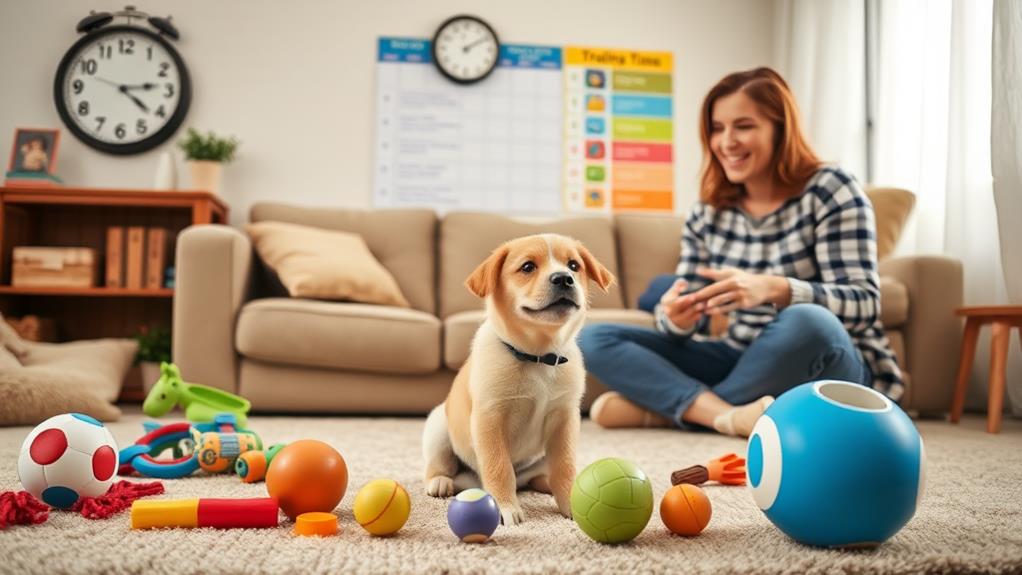
Creating a sample daily training schedule for your puppy can streamline the learning process and reinforce good habits. Start your day with a morning potty break to set the tone for the day.
After that, dedicate 15 minutes to basic commands like "sit" and "stay." Use treats to reward your puppy's efforts.
Mid-morning, take a short walk or engage in playtime to expend some energy. This will help your puppy be more focused during training sessions. After the walk, incorporate a brief 10-minute session focusing on leash walking skills.
In the afternoon, it's time for another potty break followed by a 15-minute training session on new tricks, like "roll over" or "shake." Keep it fun and interactive.
As the evening approaches, include a longer outdoor play session, followed by a relaxed training recap where you reinforce the day's learning.
Before bedtime, take one last potty break. This structured schedule helps your puppy understand expectations and creates a strong foundation for future training. Remember, consistency is key to effective learning and a happy puppy!
Tips for Consistency and Success
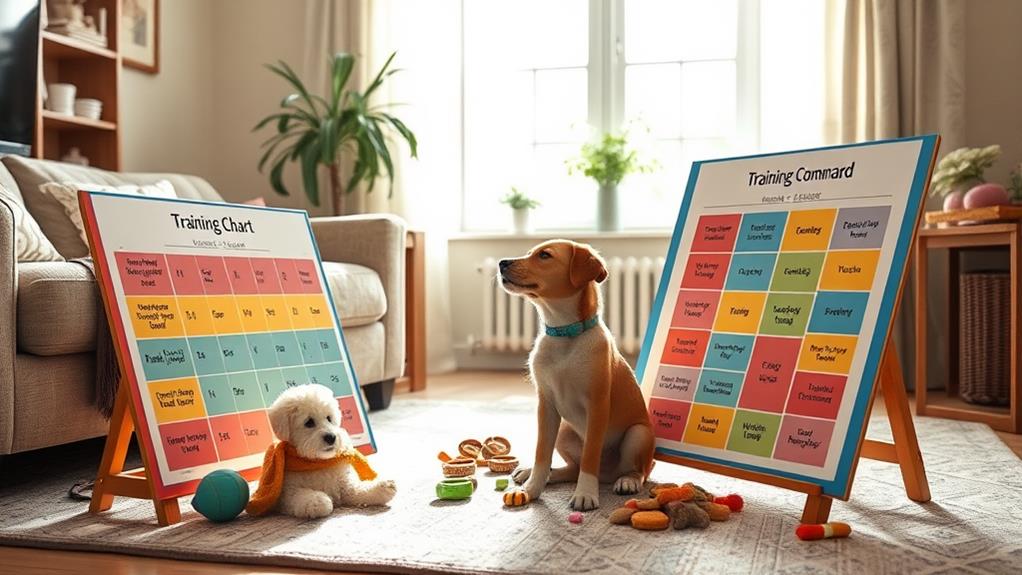
Maintaining consistency in your puppy training routine is indispensable for success. To accomplish this, set a specific training time each day and stick to it. Puppies thrive on routine, so try to train at the same time, whether it's morning or evening. Use the same commands and cues consistently; this helps your puppy understand what you expect.
Don't forget to reward your puppy immediately after they perform the desired behavior. This reinforcement strengthens their learning and establishes a clear link between the action and the reward. Keep training sessions short—around 5 to 10 minutes—so your puppy stays engaged and excited.
Involve all family members in the training process to guarantee everyone uses the same commands and methods. This avoids confusion and reinforces the behaviors you want to encourage. Additionally, practice patience. Puppies take time to learn, and consistent, positive reinforcement will yield better results.
Lastly, keep track of your puppy's progress. Note any challenges or breakthroughs in a training journal. This not only helps you stay organized but also allows you to adjust your training methods if needed. With these tips, you'll create a solid foundation for successful puppy training.
Adapting the Routine as Needed
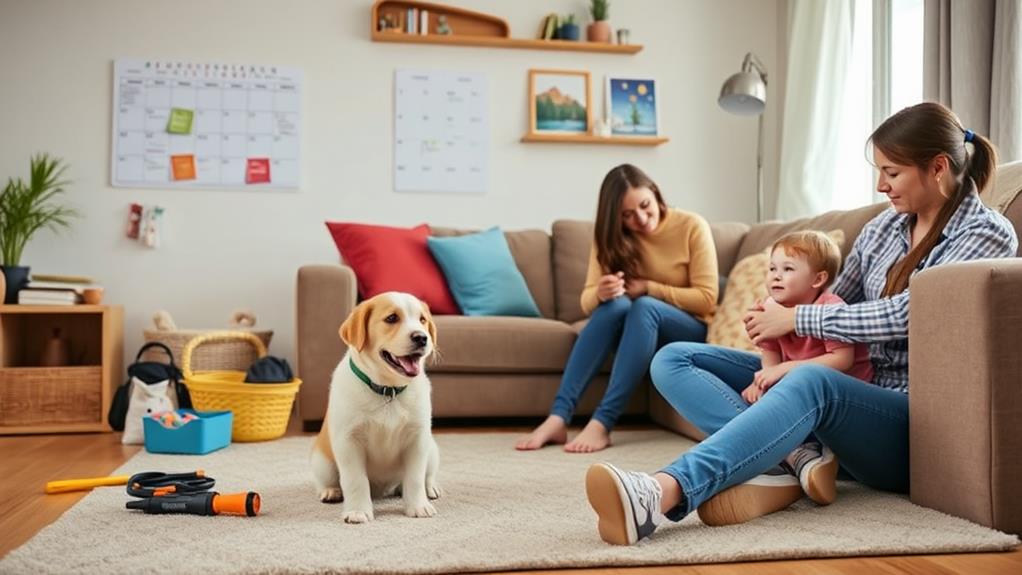
Flexibly adapting your puppy training routine is essential as your puppy grows and learns. As you notice changes in your puppy's behavior and development, you might need to tweak your approach. For instance, if your puppy starts mastering basic commands, it's time to introduce more complex tricks or tasks. This keeps your training sessions engaging and challenges your pup, preventing boredom.
Pay attention to your puppy's energy levels and mood. Some days, they might be more energetic and keen to learn, while other days, they may seem tired or distracted. Adjust the length and intensity of training sessions based on their current state. Shorter, more frequent sessions can often yield better results than long, drawn-out ones.
Additionally, be mindful of life changes that can affect your routine, like moving to a new home or changes in your schedule. Incorporate these changes into your training plan to maintain consistency. Remember, adapting your routine is part of the training journey. Stay observant, be flexible, and don't hesitate to experiment with new techniques that suit your puppy's evolving needs. This way, you'll foster a positive learning environment and strengthen your bond.
Frequently Asked Questions
What Age Should I Start Training My Puppy?
You can start training your puppy as early as eight weeks old. At this age, they're keen to learn and absorb information quickly. Consistent training helps them develop good habits and strengthens your bond.
How Long Should Each Training Session Last?
Each training session should last about 5 to 10 minutes. Keeping it short helps maintain your puppy's focus and enthusiasm. You can always have multiple sessions throughout the day to reinforce learning effectively.
Can Older Dogs Benefit From a Daily Routine?
Can you imagine a life where your older dog thrives in a structured environment? Yes, older dogs absolutely benefit from a daily routine; it fosters security, reduces anxiety, and helps keep their minds sharp and engaged.
What if My Puppy Refuses to Follow Commands?
If your puppy refuses to follow commands, stay patient and consistent. Use positive reinforcement like treats or praise to encourage desired behavior. Keep training sessions short and fun to maintain their interest and focus.
How Do I Socialize My Puppy Within the Routine?
It's funny how socializing your puppy can feel like a challenging task, yet it's simply about getting out there. You'll integrate outings into your daily routine, exposing them to new sights, sounds, and friends.
Conclusion
Establishing a consistent daily routine for your puppy isn't just a good idea; it's essential for their development. Studies show that dogs thrive on predictability, reducing anxiety and enhancing learning. By sticking to a structured schedule, you'll set your puppy up for success, making training easier and more effective. Remember, adapting your routine as your puppy grows is key. So, stay flexible and attentive, and watch your furry friend flourish into a well-behaved companion!

